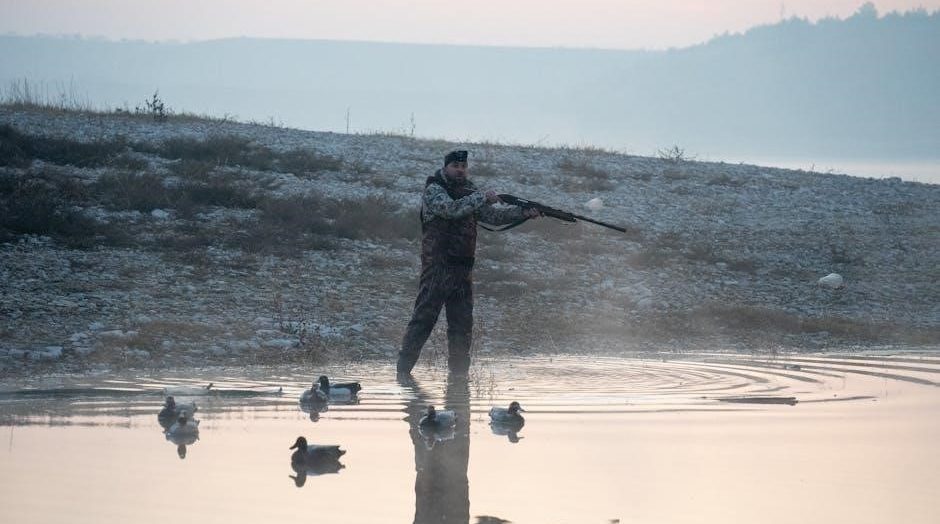Michigan offers exceptional waterfowl hunting opportunities, with its diverse wetlands and abundant duck species. Professional guides provide expertise, ensuring successful hunts through local knowledge and proven strategies.
1.1 Overview of Duck Hunting in Michigan
Michigan is renowned for its exceptional waterfowl hunting opportunities, with vast wetlands and diverse duck species attracting hunters nationwide; The state’s strategic location along major flyways ensures a consistent flow of migratory birds. Popular species include mallards, wood ducks, and green-winged teal. Michigan’s waterfowl hunting season is well-regulated, with clear guidelines on bag limits and hunting zones. Conservation efforts, such as habitat preservation, play a crucial role in maintaining healthy bird populations. Hunters benefit from local knowledge and expert guides to maximize their success in Michigan’s dynamic hunting environment.
1.2 Importance of Guides for Successful Hunts
Hiring a professional guide significantly enhances the success of duck hunting in Michigan. Guides possess extensive local knowledge, ensuring hunters access prime locations and timing. They provide expertise in decoy placement, calling techniques, and strategies tailored to specific species. Additionally, guides handle logistics, allowing hunters to focus on the experience. Their insight into weather patterns, bird behavior, and habitat preferences maximizes hunting efficiency. Guides also prioritize safety and ethical practices, making them indispensable for both novice and experienced hunters seeking a productive and memorable hunt.

Licensing and Regulations
Duck hunting in Michigan requires a base license, waterfowl hunting license, federal duck stamp, and HIP endorsement. Adhering to state and federal regulations is crucial for legal hunting.
2.1 Required Licenses for Duck Hunting in Michigan
To hunt ducks in Michigan, you’ll need a base license, a waterfowl hunting license, and a federal migratory bird hunting stamp (duck stamp). Additionally, a Harvest Information Program (HIP) endorsement is required, which is automatically included with your waterfowl license. Hunters under 17 must purchase a Junior Combination License, while those under 10 need a mentored youth hunting license. Ensure all licenses are valid and meet state and federal regulations before your hunt. Visit the Michigan Department of Natural Resources for details and to purchase licenses.
2.2 Federal and State Regulations
Federal and state regulations govern duck hunting in Michigan to ensure sustainable practices. Hunters must adhere to season dates, bag limits, and legal hunting hours, which vary by species and region. Nontoxic shot is required for waterfowl hunting, and the use of live decoys is prohibited. Additionally, all live, tame, or captive ducks and geese must be removed 10 days before hunting to avoid attracting migratory birds. Familiarize yourself with the Michigan Wildlife Conservation Order for comprehensive guidelines and legal descriptions to hunt responsibly and legally.
2.3 Bag Limits and Season Dates
Duck hunting in Michigan is regulated by specific bag limits and season dates to ensure sustainable hunting practices. Bag limits vary by species, with daily limits typically ranging from 1 to 6 birds, depending on the type of duck. Seasons are divided into early and late periods, with exact dates determined annually by the Michigan Department of Natural Resources. Hunters must stay informed about these regulations, as they are subject to change. Always consult the Michigan Wildlife Conservation Order for the most accurate and up-to-date information to ensure compliance.
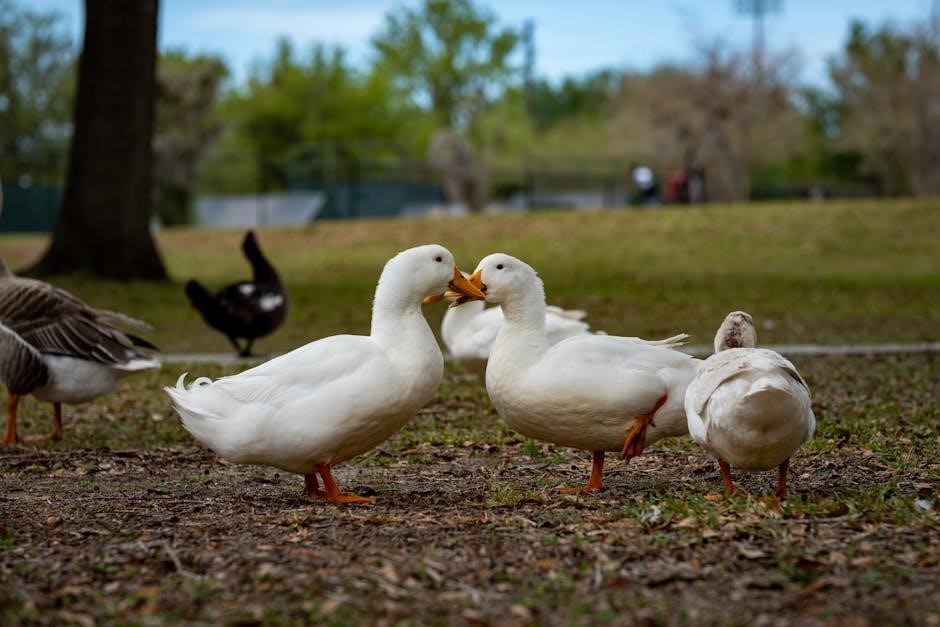
Best Locations for Duck Hunting in Michigan
Michigan offers prime duck hunting locations, with Saginaw Bay, Lake Erie, and Upper Peninsula wetlands being top spots. Diverse habitats attract abundant waterfowl species, enhancing hunting experiences.
3.1 Popular Waterfowl Areas in Michigan
Michigan boasts several prime waterfowl hunting locations, including Saginaw Bay, known for its abundant duck populations, and Lake Erie, which attracts migratory species. The Upper Peninsula offers remote wilderness areas teeming with waterfowl, while regions like Seney National Wildlife Refuge and Shiawassee National Wildlife Refuge provide protected habitats. These areas are renowned for their diverse duck species, making them ideal for both seasoned hunters and beginners. Scouting these locations beforehand ensures a successful and enjoyable hunting experience.
3.2 Public vs. Private Hunting Lands
Michigan offers both public and private hunting lands for waterfowl enthusiasts. Public areas, such as state game reserves and national wildlife refuges, provide accessible options with diverse habitats. Private lands often require permits or leases but may offer more controlled environments and fewer hunters. Public lands can be crowded during peak seasons, while private properties typically ensure exclusivity and better chances of success. Hunters should research and compare these options based on their preferences, budget, and hunting goals to maximize their experience.
3.3 Scouting Tips for Prime Hunting Spots
Scouting is crucial for identifying prime duck hunting locations in Michigan. Look for areas with abundant waterfowl activity, such as marshes, wetlands, and shorelines. Use binoculars to observe bird movements and patterns. Pay attention to food sources like aquatic plants and grains, as ducks often congregate there. Study weather conditions and water levels, as these can impact habitat preferences. Early morning and late evening scouting trips can reveal the best spots, ensuring a successful hunt by understanding duck behavior and habitat use.
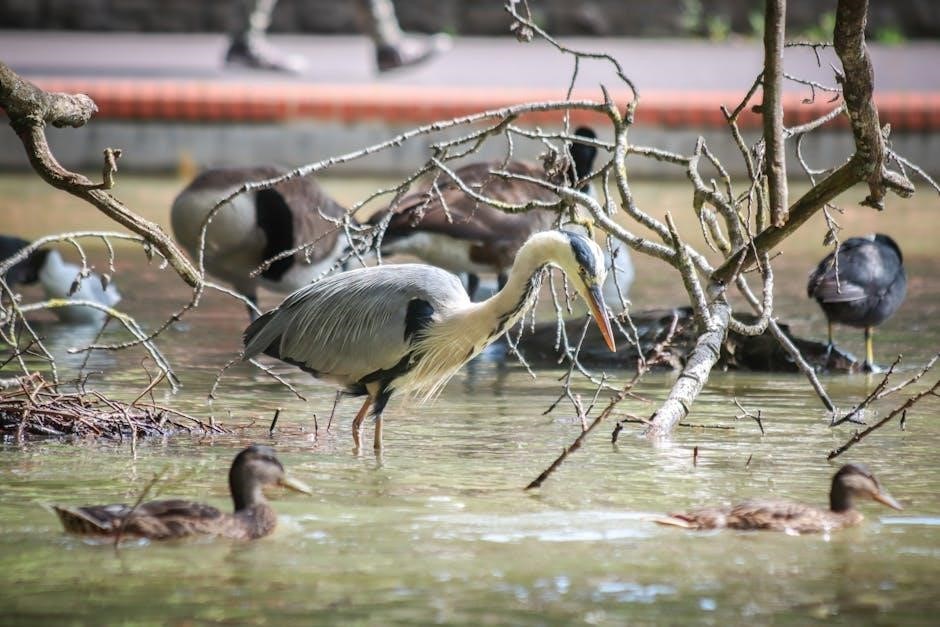
Essential Gear for Duck Hunting
Duck hunting requires reliable firearms, specialized ammunition, decoys, calling devices, and camouflage. Waders, waterproof clothing, and a blind are also crucial for a successful and comfortable hunt.
4.1 Firearms and Ammunition
For duck hunting, a 12-gauge shotgun is the most common choice due to its balance of power and range. Steel shot is required for waterfowl hunting to comply with federal regulations. Ammunition selection should consider the distance and type of ducks being targeted. Practice with your firearm to ensure accuracy and familiarity. Always check local regulations for specific restrictions on firearm types and shot sizes. Proper gear maintenance and safe handling are essential for a successful and safe hunt.
4.2 Decoys and Calling Devices
Decoys are essential for attracting ducks, with mallard and teal decoys being popular choices in Michigan. Use a mix of floating and field decoys to mimic natural habitats. Calling devices, such as duck calls, help lure birds within range. Practice calling techniques to mimic real duck sounds accurately. Motion decoys, like spinning wing decoys, add realism to your setup. Combine decoys and calls strategically to create an inviting environment for waterfowl, ensuring a more successful hunt. Quality decoys and precise calling can make a significant difference in attracting ducks.
4.3 Camouflage and Waders
Camouflage is crucial for blending into marsh environments, helping hunters avoid detection. Choose patterns like marsh grass or woodland tones to match Michigan’s wetlands. Waders are essential for navigating water and mud, with insulated options recommended for cold weather. Ensure your waders are waterproof and durable for long hunts. Accessories like face masks and gloves enhance concealment. Proper gear ensures comfort and effectiveness, making it easier to stay focused on the hunt. Invest in high-quality camouflage and waders to optimize your Michigan duck hunting experience.
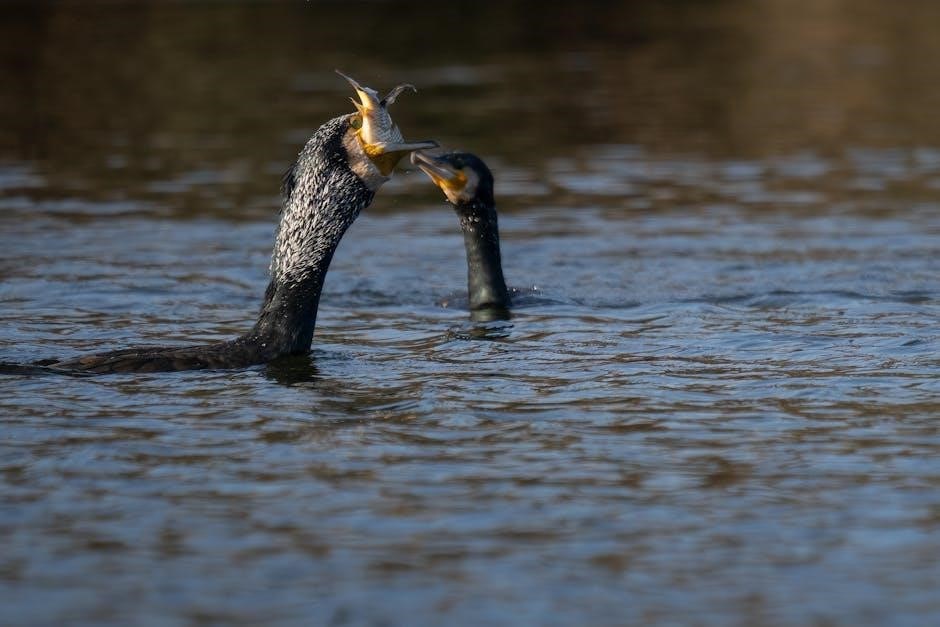
Techniques and Strategies
Effective calling, decoy placement, and adapting to weather conditions are key strategies for successful duck hunting in Michigan. Scouting and patience also play crucial roles in achieving success.
5;1 Effective Calling Techniques
Mastering duck calling is essential for attracting waterfowl in Michigan. Start with basic quacks and feeder calls, gradually incorporating more complex sounds like hen mallard calls. Practice timing and tone to mimic real ducks. Using high-quality calls and maintaining a natural cadence enhances effectiveness. Guides often emphasize blending calls with environmental sounds to create realistic scenarios, increasing the likelihood of luring ducks to your location during hunts.
5.2 Decoy Placement and Setup
Decoy placement is crucial for a successful hunt in Michigan. Position decoys to mimic natural duck behavior, with open water areas and vegetation attracting waterfowl. Use a mix of floating and field decoys, ensuring movement with spinners or flappers. Place decoys upwind to draw ducks toward your blind. Guides recommend varying decoy numbers and species to match local waterfowl populations. Proper setup creates a realistic hunting environment, increasing the chances of attracting ducks and ensuring a memorable experience for hunters of all skill levels.
5.3 Hunting During Different Weather Conditions
Hunting success in Michigan varies with weather. Wind and rain increase duck activity, making them easier to attract. Use more decoys and louder calls in windy conditions. During cold snaps, ducks seek open water, so focus on rivers and lakes. In clear skies, maintain concealment and use subtle calling. Adapt your strategy to weather changes, ensuring optimal results. Guides emphasize flexibility, as weather conditions significantly influence duck behavior and hunting outcomes, requiring hunters to adjust tactics accordingly for a successful experience.
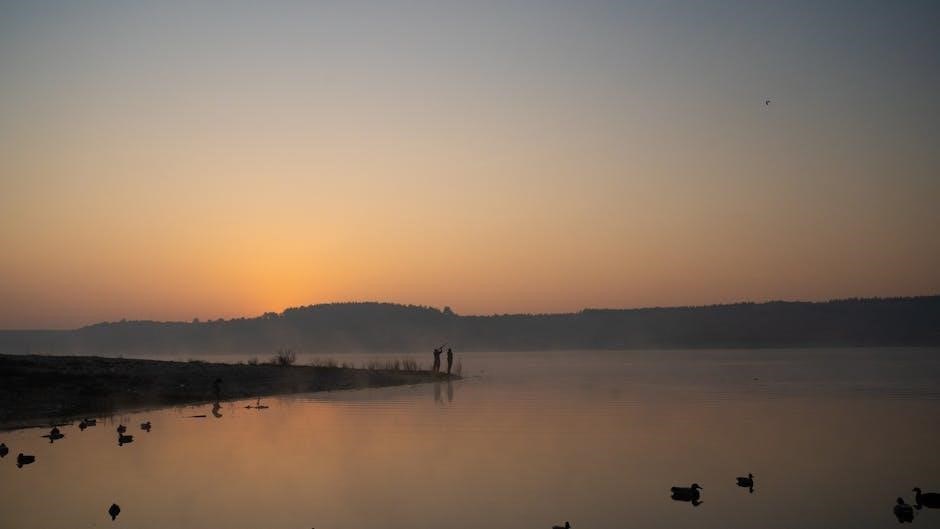
Role of Guides in Michigan Duck Hunting
Guides play a crucial role in Michigan duck hunting, offering local expertise, access to prime locations, and proven strategies to enhance success and overall hunting experience.
6.1 Benefits of Hiring a Professional Guide
Hiring a professional guide offers numerous advantages for Michigan duck hunters. Guides provide in-depth knowledge of local waterfowl habitats, ensuring access to prime hunting spots. They also share expert techniques for calling and decoy placement, increasing the likelihood of a successful hunt. Additionally, guides handle logistics, allowing hunters to focus on the experience. Their insights into weather conditions and bird behavior further enhance the outing, making guided hunts both productive and enjoyable for all skill levels.
6.2 What to Expect from a Guided Hunt
A guided duck hunt in Michigan typically begins with a pre-hunt briefing, covering safety, regulations, and strategies. Guides scout prime locations, ensuring optimal hunting conditions. They set up decoys, blinds, and calling equipment, streamlining the process. Experienced guides offer insights into bird behavior, weather patterns, and effective techniques. Hunters can expect a structured yet flexible experience, with guides adapting to changing conditions. The goal is to maximize success while fostering an enjoyable and educational outdoor adventure, tailored to both novice and seasoned hunters.
6.3 Choosing the Right Guide Service
Selecting a reputable guide service is crucial for a successful Michigan duck hunt. Look for guides with extensive local knowledge and a proven track record of success. Ensure they are licensed and adhere to state and federal regulations. Check reviews and ask for references to gauge their expertise and customer satisfaction. A good guide will tailor the hunt to your needs, ensuring a safe and enjoyable experience. Their skills in scouting, calling, and decoy placement can significantly enhance your hunting success and overall satisfaction.
Conservation and Ethical Hunting Practices
Conservation efforts, like habitat restoration, are vital for sustaining waterfowl populations. Ethical hunting practices ensure respect for nature and promote sustainable hunting for future generations.
7.1 Habitat Conservation Efforts
Habitat conservation is crucial for sustaining Michigan’s waterfowl populations. Organizations like Ducks Unlimited actively restore wetlands and marshes, ensuring ducks have thriving habitats. These efforts focus on preserving natural nesting grounds, combating invasive species, and enhancing water quality. Michigan’s vast wetlands are vital for migratory birds, making conservation a priority for both hunters and environmentalists. By protecting these ecosystems, future generations can enjoy abundant duck populations and successful hunting experiences.
7.2 Ethical Hunting Practices
Ethical hunting practices are essential for maintaining balance in Michigan’s ecosystems. Hunters must follow regulations, respect bag limits, and avoid overhunting to ensure sustainable populations. Using non-toxic ammunition and avoiding live decoys are key ethical standards. Hunters should also minimize habitat disturbance and practice fair chase, ensuring a humane and responsible approach. By adhering to these principles, hunters contribute to the long-term health of waterfowl populations and uphold the sport’s traditions.
7.3 Role of Organizations Like Ducks Unlimited
Organizations like Ducks Unlimited play a vital role in conservation efforts, protecting and restoring wetland habitats crucial for waterfowl. They fund projects in Michigan to preserve marshes and wetlands, ensuring sustainable ecosystems. These groups also advocate for hunting regulations and education, promoting ethical practices. By supporting conservation, they help maintain healthy duck populations, benefiting both hunters and the environment. Their efforts are instrumental in safeguarding waterfowl habitats for future generations of hunters and wildlife enthusiasts.

Safety and Preparation
Ensure a safe hunt by checking weather, wearing life jackets, and carrying emergency supplies. Verify licenses and gear before heading out.
8.1 Safety Tips for Waterfowl Hunting
Safety is paramount in waterfowl hunting. Always wear a properly fitted life jacket and ensure your boat is seaworthy. Check weather conditions before heading out, as water can become dangerous quickly. Carry a first-aid kit, emergency whistle, and communication devices. Wear visible clothing to avoid accidents with other hunters. Handle firearms with care, ensuring the muzzle is never pointed at people. Familiarize yourself with local regulations and hunting areas to avoid hazards. Stay prepared for changing conditions and inform someone of your itinerary.
8.2 Pre-Hunt Checklist
Ensure a successful and safe hunt by preparing thoroughly. Verify licenses, stamps, and permits are up to date. Check weather forecasts and water conditions. Inspect firearms, decoys, and gear for proper function. Pack essentials like ammunition, calls, camouflage, and a first-aid kit. Charge communication devices and inform someone of your itinerary. Familiarize yourself with hunting locations and regulations. Bring refreshments and stay prepared for variable conditions. A well-organized checklist ensures nothing is overlooked, enhancing both safety and hunting efficiency.
8.3 Emergency Preparedness
Always be prepared for emergencies while duck hunting. Carry a first-aid kit, a whistle, and a fully charged phone or two-way radio. Pack extra clothing, a lighter or fire starter, and a small emergency shelter. Familiarize yourself with the area and inform someone of your hunting plans. Know basic first aid and CPR. Keep a flashlight and snacks handy. In case of cold weather, bring warm layers and waterproof gear. A well-prepared hunter can handle unexpected situations safely and effectively.
Mi chigan duck hunting guides offer invaluable expertise, ensuring memorable and successful hunts. Their knowledge of local habitats and regulations maximizes your hunting experience in Michigan’s diverse waterfowl regions.
9.1 Recap of Key Points
Michigan duck hunting guides are essential for navigating the state’s diverse waterfowl habitats and regulations. They provide expert knowledge on scouting, decoy placement, and calling techniques, ensuring successful hunts. Proper licensing and adherence to federal and state laws are crucial for ethical hunting practices. Guides also emphasize conservation efforts and safety, making them invaluable for both novice and experienced hunters seeking a rewarding experience in Michigan’s wetlands.
9.2 Final Tips for a Successful Hunt
For a successful Michigan duck hunt, prioritize thorough scouting to identify prime locations. Ensure you have the right gear, including reliable firearms, decoys, and camouflage. Practice effective calling techniques and strategically place decoys to attract waterfowl. Stay adaptable to weather conditions and duck behavior. Trust local guides for insights and adhere to all regulations. Above all, remain patient and persistent, as success often comes from dedication and a deep understanding of the sport and its environment.
